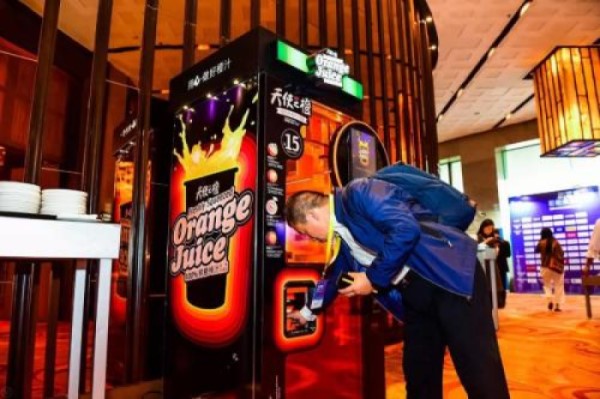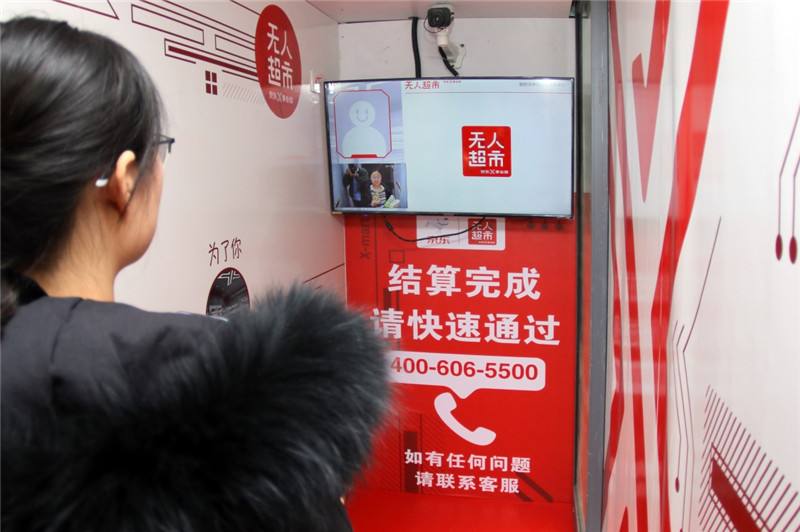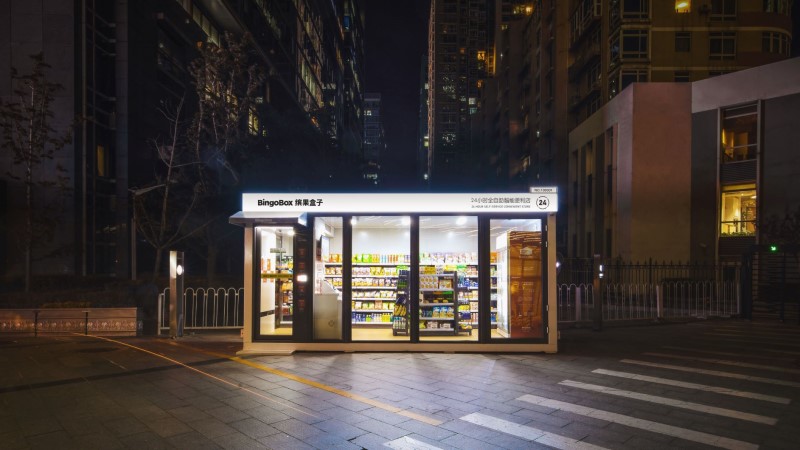

Imagine you are ready to bring back home a full cart of Christmas food and gifts from the biggest supermarket in your neighborhood. At all the counters, long lines are gradually formed by dozens of people who are grumpy about waiting, while the cashiers are slowly scanning the bar codes on piles of items.
Shopping might basically satisfy all of Maslow’s hierarchy of needs, but the last stop of such a pleasurable trip can sometimes be a nightmare.
Now, this big challenge standing between the pleasures of shopping has been unshackled in China.

(File pic of chips with RFID tags at a JD unmanned supermarket)
Technology-driven business change
Thanks to China’s booming e-commerce, cashless payment has brought along many opportunities and the unmanned retail industry is one of them. It started off as do-it-your-self stores and cashier-free counters where customers could check out after scan and pay for their items. Then, soon afterward, facial recognition and motion capture technology were used, removing the final obstacle of waiting in line in shopping.
According to the new book of China Machine Press, Unmanned Retail: Technology-driven Business Change, the unmanned retail industry is expected to reach 2 trillion yuan ($287.5 billion) in trade volume by 2022, with a total user frequency topping 245 million times.
“If the current retail industry follows the trends set by Japan and the US, that is, in the form of vending machines and supermarkets, then China is ushering in the reform of the new retail modes and might redefine the retail industry,” Hector Tseng, senior director of the unmanned supermarket at the X Business Unit of China’s e-commerce giant JD.com, said at the book launch event in Beijing in September.
Beyond vending machines
Traditional vending machines never took up the full stage of China’s retail industry, but a new kind of retail is sprouting up in dozens of Chinese cities with thousands of machines from ready to serve residents and office workers.
Similar to traditional machines, the special machines allow users to buy food – only fresher, as the machines sell fruit, yogurt, and other fresh products that cannot be sold inside a traditional machine. People only need to log in to their account and the purchase procedure uses visual recognition or radio-frequency identification (RFID) reading, making it a simple and cashless process: door opens, goods taken, door closes, billed automatically.
“We know what is preferred in a different region and how much is needed every day. Is cherry more popular or chocolate cakes? Based on this data, we can guarantee the best appropriation of different products in each machine, so that the fruit will always stay fresh and will not go bad,” Shang Xiaohang, Director of Strategic Cooperation Department of Missfresh, one of the machine suppliers, introduced at the book launch event.
In addition to startups like Missfresh, many more companies have embraced the new technology-driven vending machines. At this year’s unmanned retail expo in Shanghai, several Chinese companies boasted their sophisticated, unique machines. However, many challenges remain for newcomers in the industry, including a high product damage rate and slow billing time.

(File pic of a man takes out a glass of juice from a vending machine)
“Just walk out”
Meanwhile, some bigger companies have set their sights on something even bigger.
Now, at JD’s unmanned supermarkets, customers only need to log in to their shopping account and have their faces scanned before entering. After that, one can fully enjoy the completely free shopping experience. No more worries about long lines at the cashier. Just bring everything to a scanning zone for the radio-frequency identification (RFID) tags to be read and the shopping account will be automatically billed. No scan with a smartphone required.
JD launched its first public unmanned supermarket in Yantai, east China’s Shandong province, on December 30, 2017, beating its US counterpart Amazon Go by some 20 days, as the latter opened to the public on January 22.

(File pic of a female customer having her face and goods scanned before leaving a JD unmanned store)
“New retail means data. The main point is to shorten the time spent on searching for something and checking out,” Hou Xin, a solution architect at Amazon’s AWS Elemental, said at the same event, boasting Amazon Go’s “Just walk out” Shopping experience. The US stores do not even require time for item scanning time, since motion capture technology and smart shelves are used to know what and how many items are taken away.
Similar technology has also been under tested at JD’s convenience store since October 2017 for future deployment at the company’s unmanned supermarkets. With cameras on the smart shelves, the store will also be able to conduct thermal detection to analyze product popularity for better store layout – another important factor for retail industry management.
But all those giants lag behind the Chinese startup BingoBox, which launched the world’s first unmanned store as early as August 2016 in Zhongshan, south China’s Guangdong province. BingoBox has entered 40 cities with hundreds of 24/7 unmanned stores, offering fast, self-served checkout service first with RFID tags and later with an independently designed checkout device that can automatically identify and calculate the prices of all items purchased.
The new checkout device, according to BingoBox’s CEO Chen Zilin, can effectively bring down the labor cost of some 6.5 million family-run stores in China by half. “BingoBox does not rely on high customer density. Instead the quality of the unmanned service can make it more easily survive in regions with fewer customers, hence providing more service than traditional retailers in the same area,” Chen noted.
“The rising demands under the pressure of an aging society will give the industry a further spur, and with growing investment into the industry, the future of China’s unmanned retail industry is no doubt promising,” predicted Peng Jianzhen, secretary general of China Chain Store & Franchise Association (CCFA).

(A BingoBox unmanned store stands outside a office building in a Chinese city. Photo courtesy of BingoBox)

 Award-winning photos show poverty reduction achievements in NE China's Jilin province
Award-winning photos show poverty reduction achievements in NE China's Jilin province People dance to greet advent of New Year in Ameiqituo Town, Guizhou
People dance to greet advent of New Year in Ameiqituo Town, Guizhou Fire brigade in Shanghai holds group wedding
Fire brigade in Shanghai holds group wedding Tourists enjoy ice sculptures in Datan Town, north China
Tourists enjoy ice sculptures in Datan Town, north China Sunset scenery of Dayan Pagoda in Xi'an
Sunset scenery of Dayan Pagoda in Xi'an Tourists have fun at scenic spot in Nanlong Town, NW China
Tourists have fun at scenic spot in Nanlong Town, NW China Harbin attracts tourists by making best use of ice in winter
Harbin attracts tourists by making best use of ice in winter In pics: FIS Alpine Ski Women's World Cup Slalom
In pics: FIS Alpine Ski Women's World Cup Slalom Black-necked cranes rest at reservoir in Lhunzhub County, Lhasa
Black-necked cranes rest at reservoir in Lhunzhub County, Lhasa China's FAST telescope will be available to foreign scientists in April
China's FAST telescope will be available to foreign scientists in April